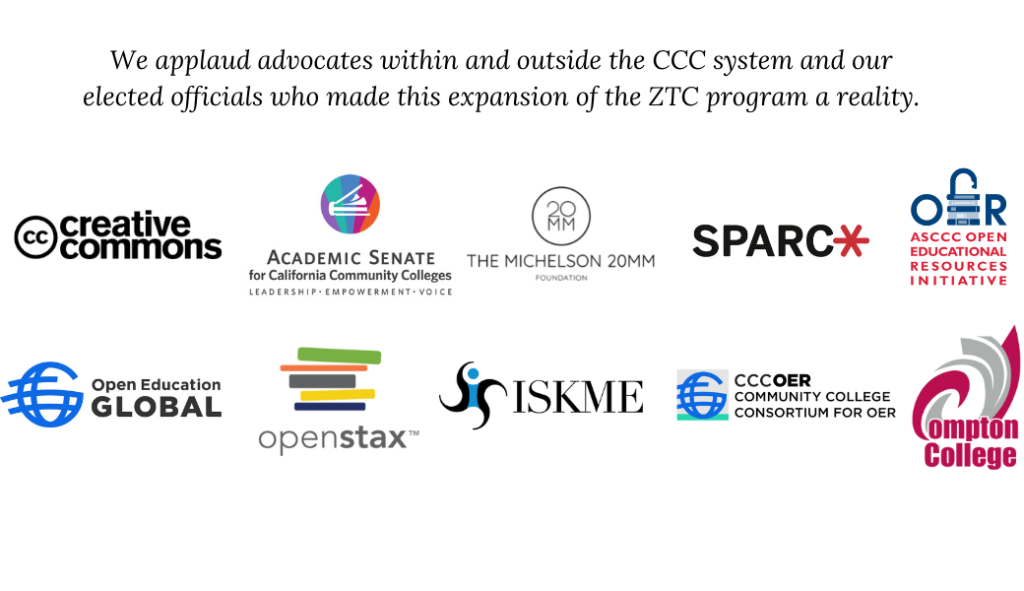Ahead of the March 21st California Community Colleges Board of Governors meeting, the Michelson 20MM Foundation outlined our vision for a successful implementation of the Zero Textbook Cost degrees included in the most recent state budget. In addition to Michelson 20MM, nine additional leaders in the OER space signed onto the letter to President Haynes and the members of the Board of Governors.
We applaud advocates within and outside the California Community Colleges system and our elected officials who made this expansion of the ZTC program a reality.
Dear President Haynes and Members of the Board of Governors,
In 2020, 65% of California students reported skipping buying course materials due to cost. When it comes to course materials, community college students face even higher affordability barriers than their peers at other institutions. Last year, Governor Gavin Newsom addressed the “usurious” broken textbook marketplace and called on the state “to disrupt that entire system nationwide” by making a historic $115 million investment in a Zero-Textbook Cost (ZTC) degree program to establish associate degrees and CTE certificate programs with no textbook costs across California Community Colleges.
The $115 million Governor Newsom dedicated to ZTC degree programs has the potential to transform the system’s course material landscape. With this funding, California stands to cement itself as a bold, national leader in textbook affordability. Such leadership comes with the responsibility to ensure that these funds are used with long-term impact top of mind, and with an understanding that how this investment is shepherded will be closely studied and will impact countless state and federal textbook affordability initiatives in the coming years.
The original $5 million of ZTC funding resulted in an estimated 800% return on investment, served over 23,000 students, and saved them over $42 million, according to data collected by pilot institutions. Students in ZTC courses experienced higher levels of passing grades and course completions, which is in line with national studies on the positive impacts of open educational resources. Students from marginalized backgrounds experience even greater benefits from OER supported courses. The system now has the resources to share these benefits with significantly more students across the system, but to do this requires identifying what made the first round of funding so successful and implementing lessons learned along the way.
- Open Educational Resources are the Essential Element of ZTC Funding
-
-
- Open Educational Resources (OER) are teaching, learning, and research materials that reside in the public domain or have been released under an open license that permits their free use and re-purposing by others.
- An emphasis on cross-district sharing and non-duplicative efforts were written into the current legislation. Only degree pathways built on OER are consistently deployable across multiple colleges with diminishing costs.
- The past ZTC success was not only in eliminating the cost barrier but ensuring students have unlimited access to materials from the first day of class to perpetuity, and educators have the flexibility that openly licensed materials offer.
- Investments in open education strengthen our education system by adding locally relevant material for instructors and students to benefit from in perpetuity. When investments are shifted to out-of-state commercial interests, the gains end when this funding ends.
- While it is permissible to use some funds to provide access to restrictive, all-rights-reserved copyright materials by purchasing or leasing copies for the college, we urge the CCC system to move forward with a plan aligned with the language of California Education Code 78052 by prioritizing “..the adaptation of existing open educational resources through existing open educational resources initiatives, or elsewhere, before creating new content” as building access to free OER can generate long-term savings for years to come.
- Employ a competitive granting process that prioritizes collaboration across districts and emphasizes sustainable solutions
-
-
- Determining the allocation of dollars via a competitive grant process was the case with the original $5M. This grant process can be crafted to ensure that colleges are set up for long term success around ZTC and that dollars are being deployed in the most efficient and sustainable way possible. Rewarding coordination across districts multiples the impact of a single grant and allows educators to make full use of the benefits of open licensing.
- To the extent “low cost” degrees are considered, grants should set strict criteria and an approval process for materials defined as “not available or cannot be developed” to ensure that the amount of truly “zero-cost” degree pathways is maximized.
-
- To truly understand the impact of this transformative investment in the ZTC program we urge the system to consider adopting a data element within their system to track these metrics.
- Data collection centered around meaningful metrics—such as which section of a course is participating in ZTC pathways, which students have gone through ZTC courses, and how many students have completed the pathway—would allow the campus to accurately track student outcomes.
- The capacity for data collection understandably varies from campus to campus depending on local resources. Directing a portion of the ZTC funds to level this playing field by funding technical leads and building the infrastructure for data collection would be essential for any robust and meaningful data collection plan.
We would like to thank the President and the Board for your shared commitment and continued work to advance issues of affordability. California and the nation are clearly at a key inflection point on the issue of textbook affordability. This investment in ZTC has the potential to have tremendous impact for all students.

Phillip Kim
CEO of The Michelson 20MM Foundation
Download the Open Letter
Michelson 20MM is a private, nonprofit foundation seeking to accelerate progress towards a more just world through grantmaking, operating programs, and impact investing. Co-chaired and funded by Alya and Gary Michelson, Michelson 20MM is part of the Michelson Philanthropies network of foundations.
To sign up for our newsletter, click here.

